Slater and Gordon Case: Exploring the Law of Business Organization
VerifiedAdded on 2023/06/12
|8
|2264
|422
Case Study
AI Summary
This case study examines the legal ramifications faced by Slater and Gordon Law Firm, focusing on allegations of misrepresented financial prospects and breach of duty by its directors. It analyzes the issues under the Corporations Act 2001, specifically addressing the duties of directors, disclosure obligations, and potential civil liabilities. The study further explores the concept of piercing the corporate veil in light of fraudulent activities and misleading conduct, concluding that the directors could be held personally liable. The document provides an overview of the legal principles, application to the case facts, and relevant sections of the Corporations Act. Desklib is a valuable platform to find similar solved assignments and study resources.
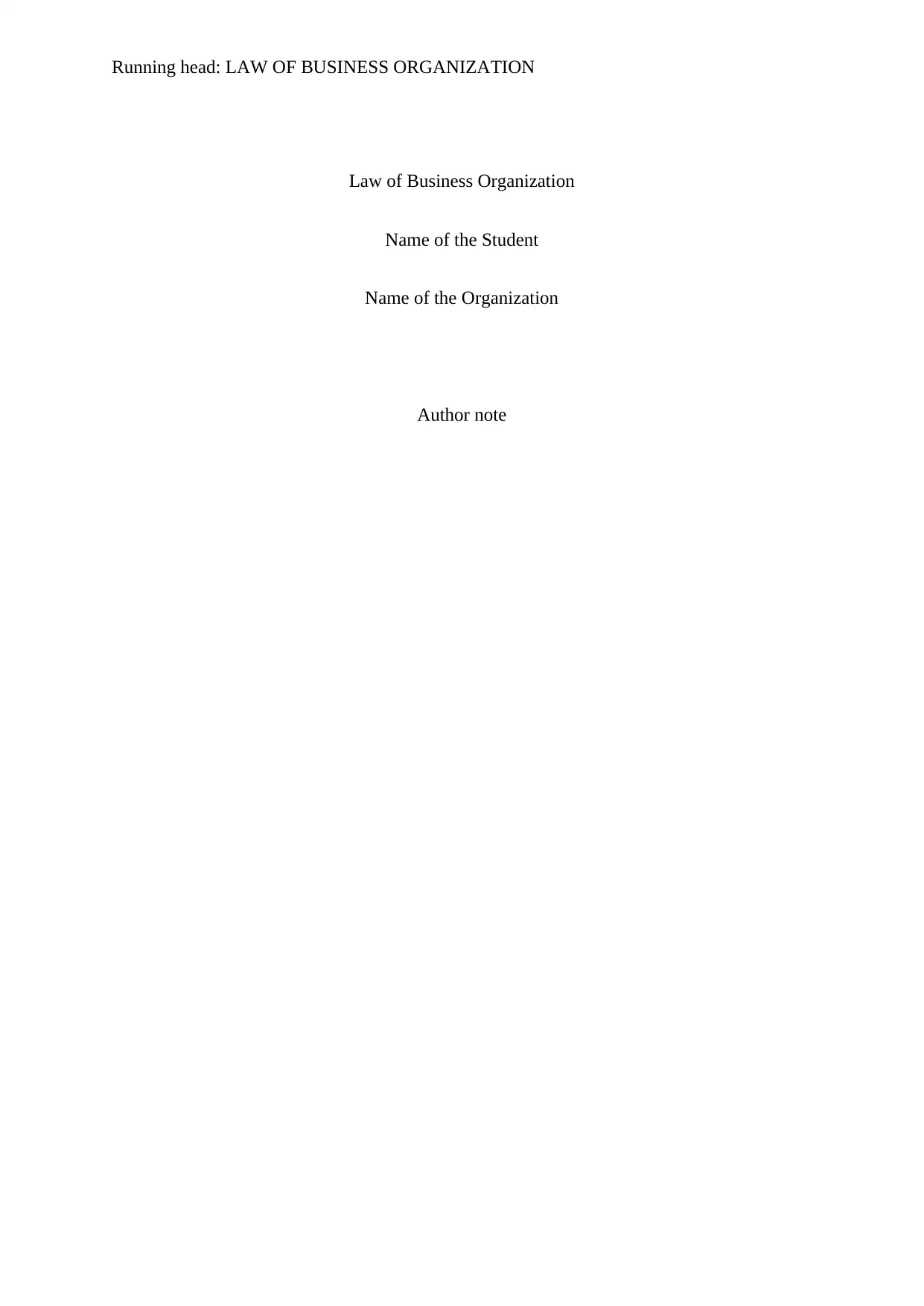
Running head: LAW OF BUSINESS ORGANIZATION
Law of Business Organization
Name of the Student
Name of the Organization
Author note
Law of Business Organization
Name of the Student
Name of the Organization
Author note
Paraphrase This Document
Need a fresh take? Get an instant paraphrase of this document with our AI Paraphraser
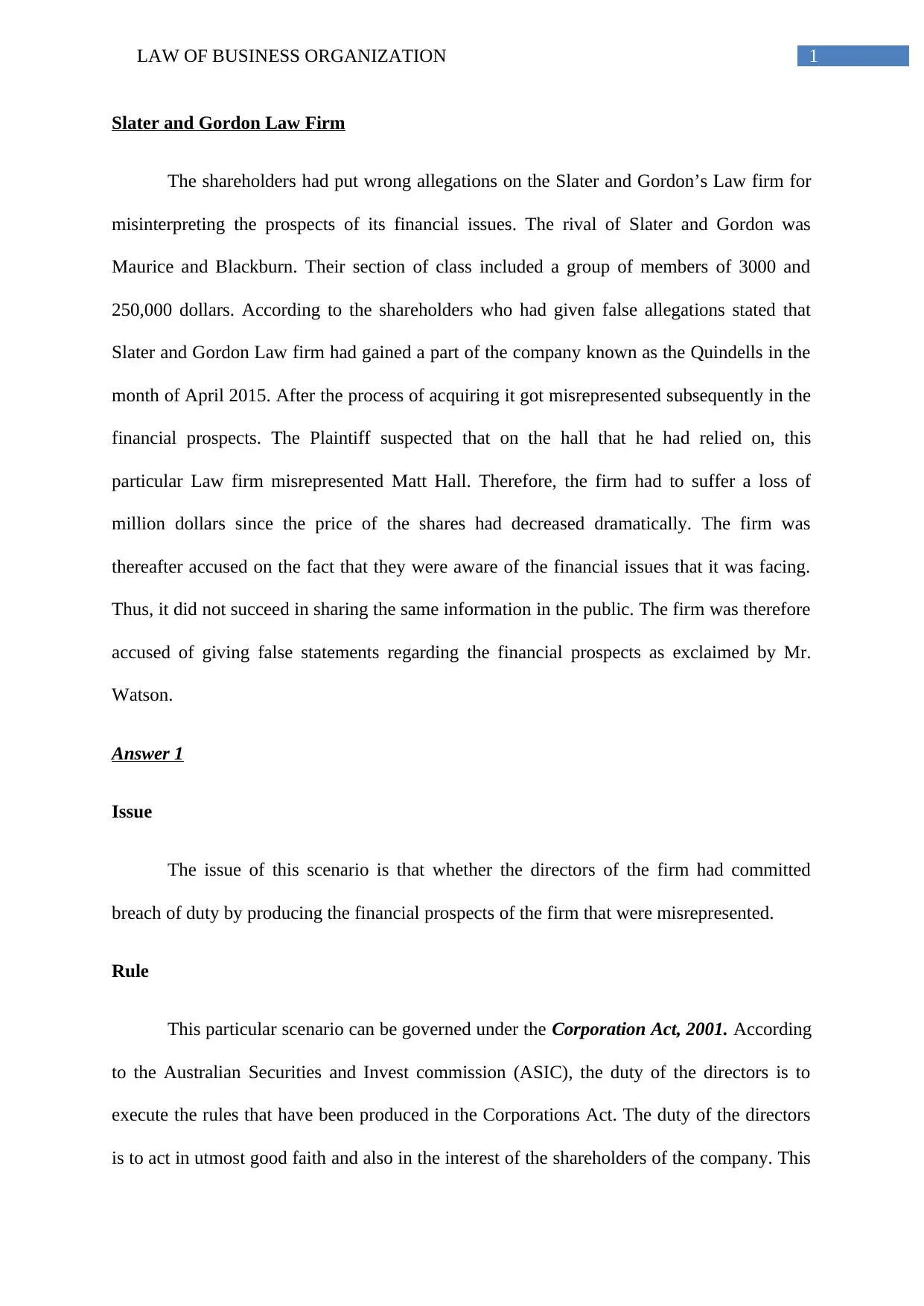
1LAW OF BUSINESS ORGANIZATION
Slater and Gordon Law Firm
The shareholders had put wrong allegations on the Slater and Gordon’s Law firm for
misinterpreting the prospects of its financial issues. The rival of Slater and Gordon was
Maurice and Blackburn. Their section of class included a group of members of 3000 and
250,000 dollars. According to the shareholders who had given false allegations stated that
Slater and Gordon Law firm had gained a part of the company known as the Quindells in the
month of April 2015. After the process of acquiring it got misrepresented subsequently in the
financial prospects. The Plaintiff suspected that on the hall that he had relied on, this
particular Law firm misrepresented Matt Hall. Therefore, the firm had to suffer a loss of
million dollars since the price of the shares had decreased dramatically. The firm was
thereafter accused on the fact that they were aware of the financial issues that it was facing.
Thus, it did not succeed in sharing the same information in the public. The firm was therefore
accused of giving false statements regarding the financial prospects as exclaimed by Mr.
Watson.
Answer 1
Issue
The issue of this scenario is that whether the directors of the firm had committed
breach of duty by producing the financial prospects of the firm that were misrepresented.
Rule
This particular scenario can be governed under the Corporation Act, 2001. According
to the Australian Securities and Invest commission (ASIC), the duty of the directors is to
execute the rules that have been produced in the Corporations Act. The duty of the directors
is to act in utmost good faith and also in the interest of the shareholders of the company. This
Slater and Gordon Law Firm
The shareholders had put wrong allegations on the Slater and Gordon’s Law firm for
misinterpreting the prospects of its financial issues. The rival of Slater and Gordon was
Maurice and Blackburn. Their section of class included a group of members of 3000 and
250,000 dollars. According to the shareholders who had given false allegations stated that
Slater and Gordon Law firm had gained a part of the company known as the Quindells in the
month of April 2015. After the process of acquiring it got misrepresented subsequently in the
financial prospects. The Plaintiff suspected that on the hall that he had relied on, this
particular Law firm misrepresented Matt Hall. Therefore, the firm had to suffer a loss of
million dollars since the price of the shares had decreased dramatically. The firm was
thereafter accused on the fact that they were aware of the financial issues that it was facing.
Thus, it did not succeed in sharing the same information in the public. The firm was therefore
accused of giving false statements regarding the financial prospects as exclaimed by Mr.
Watson.
Answer 1
Issue
The issue of this scenario is that whether the directors of the firm had committed
breach of duty by producing the financial prospects of the firm that were misrepresented.
Rule
This particular scenario can be governed under the Corporation Act, 2001. According
to the Australian Securities and Invest commission (ASIC), the duty of the directors is to
execute the rules that have been produced in the Corporations Act. The duty of the directors
is to act in utmost good faith and also in the interest of the shareholders of the company. This
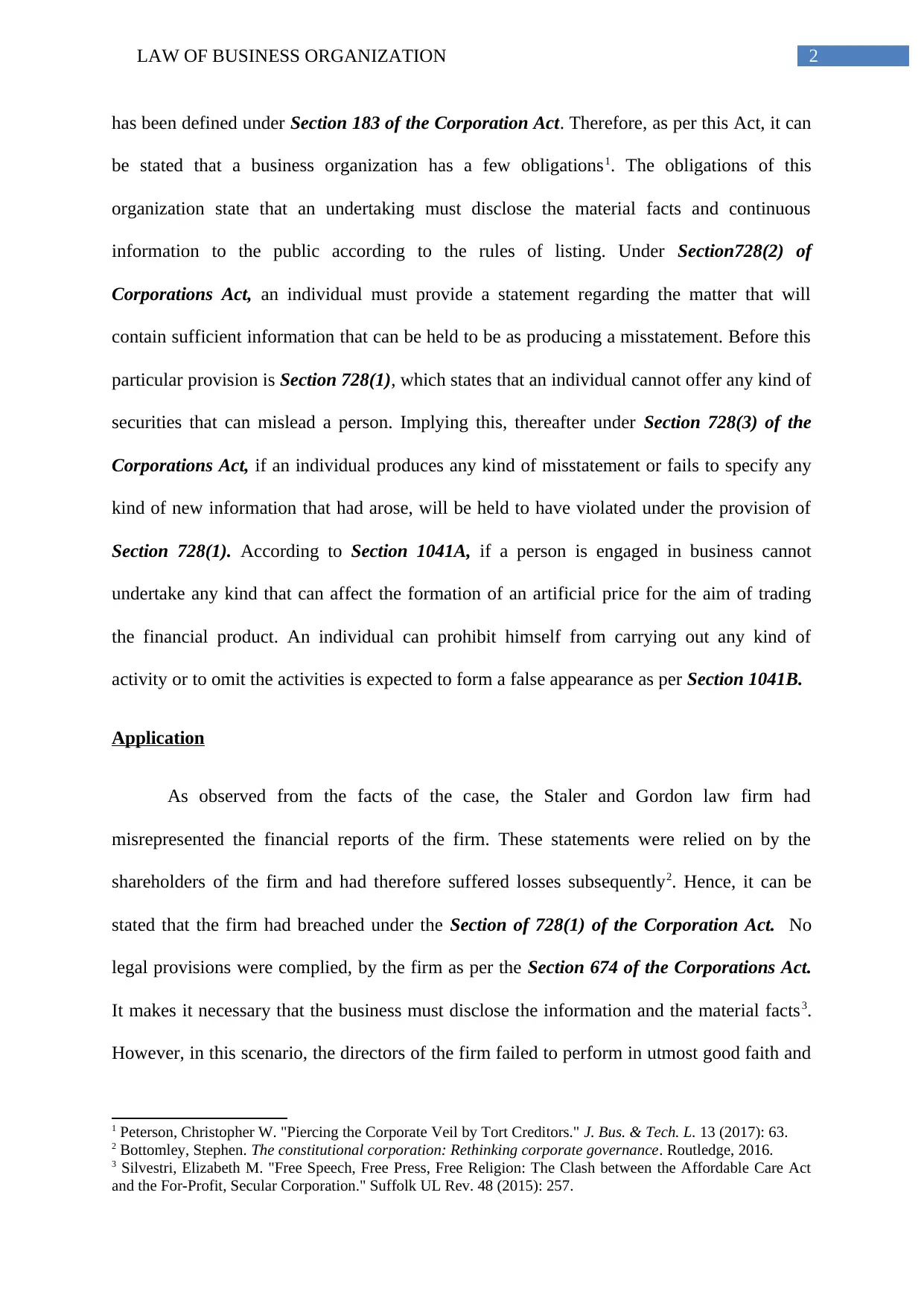
2LAW OF BUSINESS ORGANIZATION
has been defined under Section 183 of the Corporation Act. Therefore, as per this Act, it can
be stated that a business organization has a few obligations1. The obligations of this
organization state that an undertaking must disclose the material facts and continuous
information to the public according to the rules of listing. Under Section728(2) of
Corporations Act, an individual must provide a statement regarding the matter that will
contain sufficient information that can be held to be as producing a misstatement. Before this
particular provision is Section 728(1), which states that an individual cannot offer any kind of
securities that can mislead a person. Implying this, thereafter under Section 728(3) of the
Corporations Act, if an individual produces any kind of misstatement or fails to specify any
kind of new information that had arose, will be held to have violated under the provision of
Section 728(1). According to Section 1041A, if a person is engaged in business cannot
undertake any kind that can affect the formation of an artificial price for the aim of trading
the financial product. An individual can prohibit himself from carrying out any kind of
activity or to omit the activities is expected to form a false appearance as per Section 1041B.
Application
As observed from the facts of the case, the Staler and Gordon law firm had
misrepresented the financial reports of the firm. These statements were relied on by the
shareholders of the firm and had therefore suffered losses subsequently2. Hence, it can be
stated that the firm had breached under the Section of 728(1) of the Corporation Act. No
legal provisions were complied, by the firm as per the Section 674 of the Corporations Act.
It makes it necessary that the business must disclose the information and the material facts3.
However, in this scenario, the directors of the firm failed to perform in utmost good faith and
1 Peterson, Christopher W. "Piercing the Corporate Veil by Tort Creditors." J. Bus. & Tech. L. 13 (2017): 63.
2 Bottomley, Stephen. The constitutional corporation: Rethinking corporate governance. Routledge, 2016.
3 Silvestri, Elizabeth M. "Free Speech, Free Press, Free Religion: The Clash between the Affordable Care Act
and the For-Profit, Secular Corporation." Suffolk UL Rev. 48 (2015): 257.
has been defined under Section 183 of the Corporation Act. Therefore, as per this Act, it can
be stated that a business organization has a few obligations1. The obligations of this
organization state that an undertaking must disclose the material facts and continuous
information to the public according to the rules of listing. Under Section728(2) of
Corporations Act, an individual must provide a statement regarding the matter that will
contain sufficient information that can be held to be as producing a misstatement. Before this
particular provision is Section 728(1), which states that an individual cannot offer any kind of
securities that can mislead a person. Implying this, thereafter under Section 728(3) of the
Corporations Act, if an individual produces any kind of misstatement or fails to specify any
kind of new information that had arose, will be held to have violated under the provision of
Section 728(1). According to Section 1041A, if a person is engaged in business cannot
undertake any kind that can affect the formation of an artificial price for the aim of trading
the financial product. An individual can prohibit himself from carrying out any kind of
activity or to omit the activities is expected to form a false appearance as per Section 1041B.
Application
As observed from the facts of the case, the Staler and Gordon law firm had
misrepresented the financial reports of the firm. These statements were relied on by the
shareholders of the firm and had therefore suffered losses subsequently2. Hence, it can be
stated that the firm had breached under the Section of 728(1) of the Corporation Act. No
legal provisions were complied, by the firm as per the Section 674 of the Corporations Act.
It makes it necessary that the business must disclose the information and the material facts3.
However, in this scenario, the directors of the firm failed to perform in utmost good faith and
1 Peterson, Christopher W. "Piercing the Corporate Veil by Tort Creditors." J. Bus. & Tech. L. 13 (2017): 63.
2 Bottomley, Stephen. The constitutional corporation: Rethinking corporate governance. Routledge, 2016.
3 Silvestri, Elizabeth M. "Free Speech, Free Press, Free Religion: The Clash between the Affordable Care Act
and the For-Profit, Secular Corporation." Suffolk UL Rev. 48 (2015): 257.
⊘ This is a preview!⊘
Do you want full access?
Subscribe today to unlock all pages.

Trusted by 1+ million students worldwide
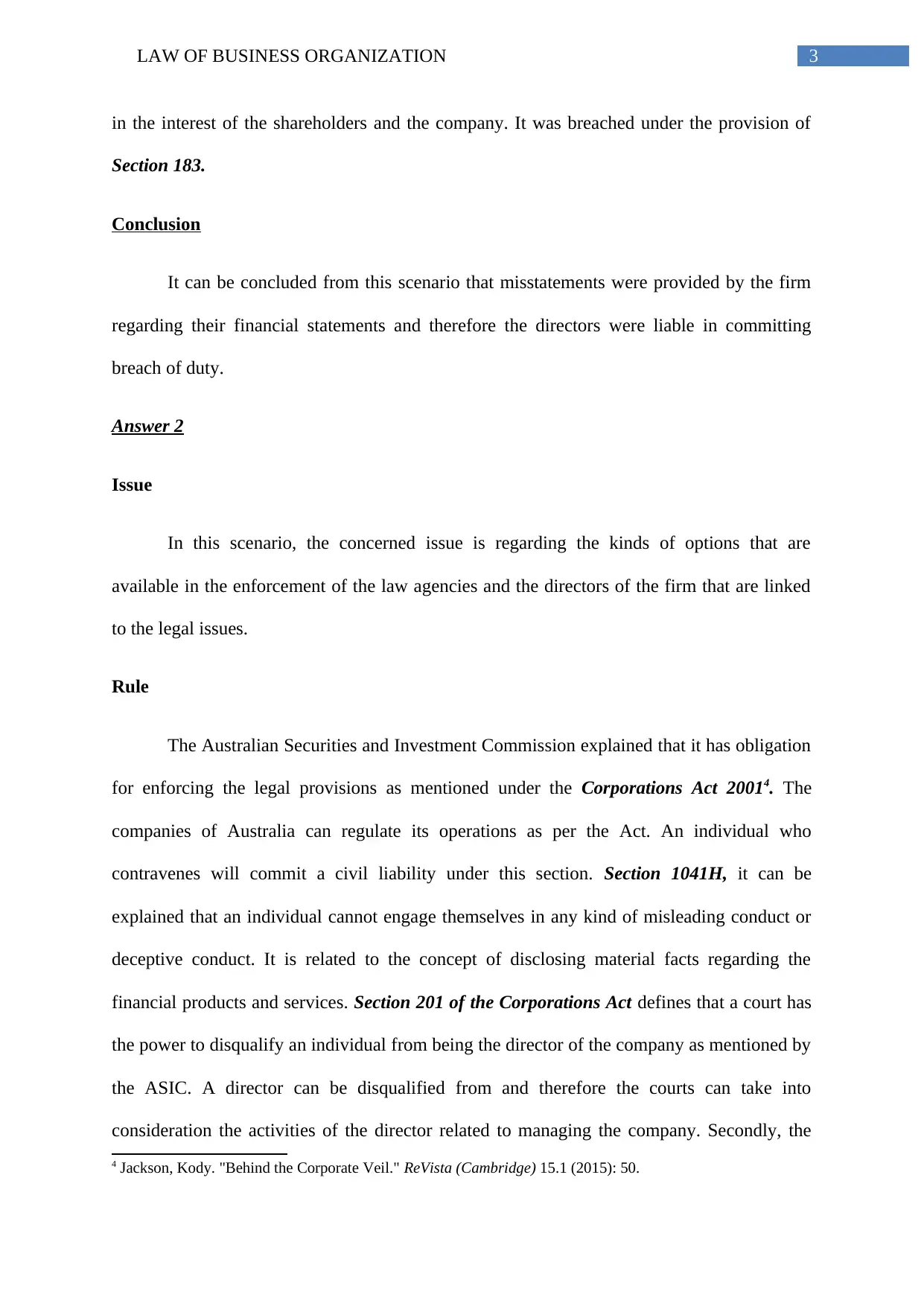
3LAW OF BUSINESS ORGANIZATION
in the interest of the shareholders and the company. It was breached under the provision of
Section 183.
Conclusion
It can be concluded from this scenario that misstatements were provided by the firm
regarding their financial statements and therefore the directors were liable in committing
breach of duty.
Answer 2
Issue
In this scenario, the concerned issue is regarding the kinds of options that are
available in the enforcement of the law agencies and the directors of the firm that are linked
to the legal issues.
Rule
The Australian Securities and Investment Commission explained that it has obligation
for enforcing the legal provisions as mentioned under the Corporations Act 20014. The
companies of Australia can regulate its operations as per the Act. An individual who
contravenes will commit a civil liability under this section. Section 1041H, it can be
explained that an individual cannot engage themselves in any kind of misleading conduct or
deceptive conduct. It is related to the concept of disclosing material facts regarding the
financial products and services. Section 201 of the Corporations Act defines that a court has
the power to disqualify an individual from being the director of the company as mentioned by
the ASIC. A director can be disqualified from and therefore the courts can take into
consideration the activities of the director related to managing the company. Secondly, the
4 Jackson, Kody. "Behind the Corporate Veil." ReVista (Cambridge) 15.1 (2015): 50.
in the interest of the shareholders and the company. It was breached under the provision of
Section 183.
Conclusion
It can be concluded from this scenario that misstatements were provided by the firm
regarding their financial statements and therefore the directors were liable in committing
breach of duty.
Answer 2
Issue
In this scenario, the concerned issue is regarding the kinds of options that are
available in the enforcement of the law agencies and the directors of the firm that are linked
to the legal issues.
Rule
The Australian Securities and Investment Commission explained that it has obligation
for enforcing the legal provisions as mentioned under the Corporations Act 20014. The
companies of Australia can regulate its operations as per the Act. An individual who
contravenes will commit a civil liability under this section. Section 1041H, it can be
explained that an individual cannot engage themselves in any kind of misleading conduct or
deceptive conduct. It is related to the concept of disclosing material facts regarding the
financial products and services. Section 201 of the Corporations Act defines that a court has
the power to disqualify an individual from being the director of the company as mentioned by
the ASIC. A director can be disqualified from and therefore the courts can take into
consideration the activities of the director related to managing the company. Secondly, the
4 Jackson, Kody. "Behind the Corporate Veil." ReVista (Cambridge) 15.1 (2015): 50.
Paraphrase This Document
Need a fresh take? Get an instant paraphrase of this document with our AI Paraphraser
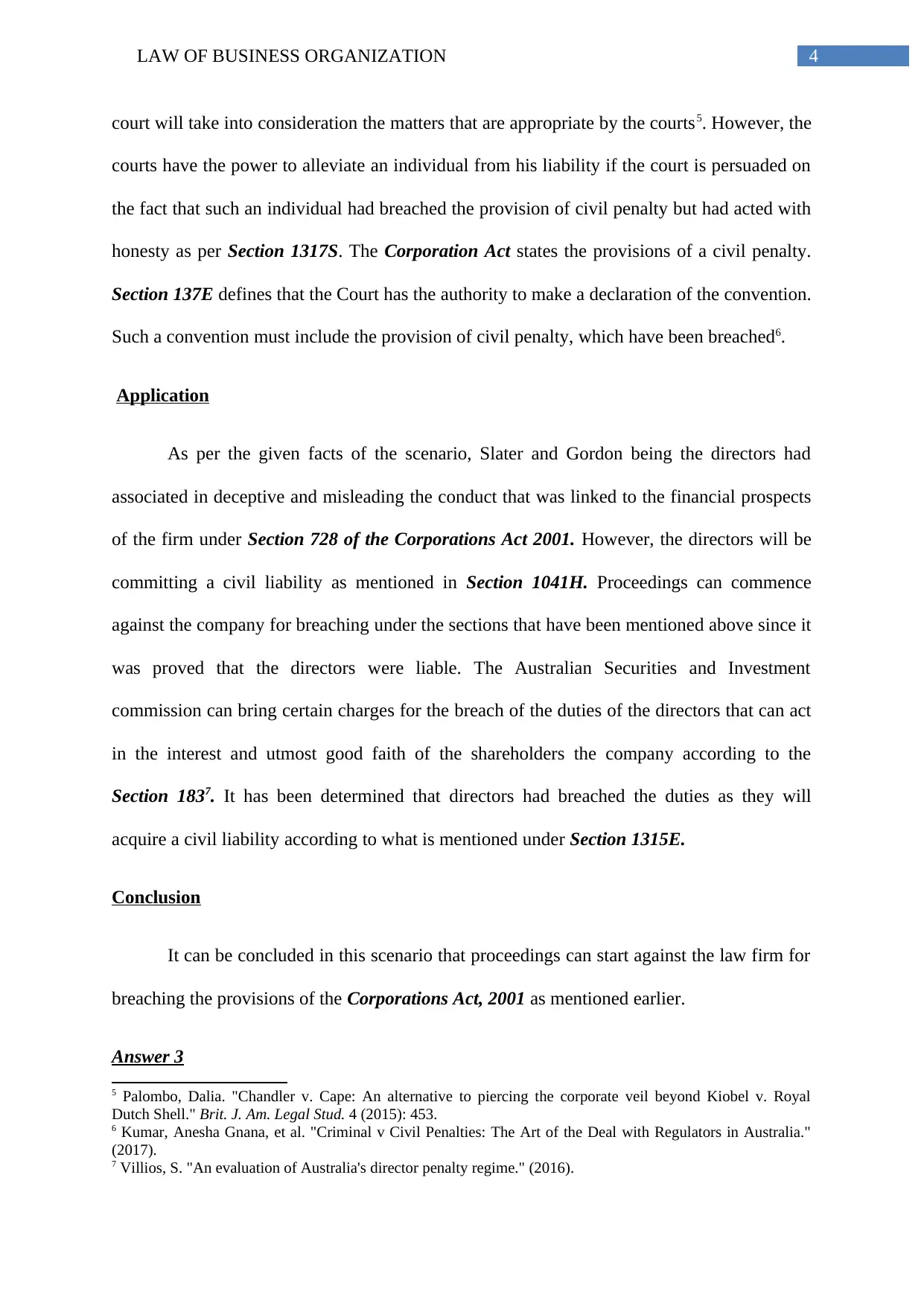
4LAW OF BUSINESS ORGANIZATION
court will take into consideration the matters that are appropriate by the courts5. However, the
courts have the power to alleviate an individual from his liability if the court is persuaded on
the fact that such an individual had breached the provision of civil penalty but had acted with
honesty as per Section 1317S. The Corporation Act states the provisions of a civil penalty.
Section 137E defines that the Court has the authority to make a declaration of the convention.
Such a convention must include the provision of civil penalty, which have been breached6.
Application
As per the given facts of the scenario, Slater and Gordon being the directors had
associated in deceptive and misleading the conduct that was linked to the financial prospects
of the firm under Section 728 of the Corporations Act 2001. However, the directors will be
committing a civil liability as mentioned in Section 1041H. Proceedings can commence
against the company for breaching under the sections that have been mentioned above since it
was proved that the directors were liable. The Australian Securities and Investment
commission can bring certain charges for the breach of the duties of the directors that can act
in the interest and utmost good faith of the shareholders the company according to the
Section 1837. It has been determined that directors had breached the duties as they will
acquire a civil liability according to what is mentioned under Section 1315E.
Conclusion
It can be concluded in this scenario that proceedings can start against the law firm for
breaching the provisions of the Corporations Act, 2001 as mentioned earlier.
Answer 3
5 Palombo, Dalia. "Chandler v. Cape: An alternative to piercing the corporate veil beyond Kiobel v. Royal
Dutch Shell." Brit. J. Am. Legal Stud. 4 (2015): 453.
6 Kumar, Anesha Gnana, et al. "Criminal v Civil Penalties: The Art of the Deal with Regulators in Australia."
(2017).
7 Villios, S. "An evaluation of Australia's director penalty regime." (2016).
court will take into consideration the matters that are appropriate by the courts5. However, the
courts have the power to alleviate an individual from his liability if the court is persuaded on
the fact that such an individual had breached the provision of civil penalty but had acted with
honesty as per Section 1317S. The Corporation Act states the provisions of a civil penalty.
Section 137E defines that the Court has the authority to make a declaration of the convention.
Such a convention must include the provision of civil penalty, which have been breached6.
Application
As per the given facts of the scenario, Slater and Gordon being the directors had
associated in deceptive and misleading the conduct that was linked to the financial prospects
of the firm under Section 728 of the Corporations Act 2001. However, the directors will be
committing a civil liability as mentioned in Section 1041H. Proceedings can commence
against the company for breaching under the sections that have been mentioned above since it
was proved that the directors were liable. The Australian Securities and Investment
commission can bring certain charges for the breach of the duties of the directors that can act
in the interest and utmost good faith of the shareholders the company according to the
Section 1837. It has been determined that directors had breached the duties as they will
acquire a civil liability according to what is mentioned under Section 1315E.
Conclusion
It can be concluded in this scenario that proceedings can start against the law firm for
breaching the provisions of the Corporations Act, 2001 as mentioned earlier.
Answer 3
5 Palombo, Dalia. "Chandler v. Cape: An alternative to piercing the corporate veil beyond Kiobel v. Royal
Dutch Shell." Brit. J. Am. Legal Stud. 4 (2015): 453.
6 Kumar, Anesha Gnana, et al. "Criminal v Civil Penalties: The Art of the Deal with Regulators in Australia."
(2017).
7 Villios, S. "An evaluation of Australia's director penalty regime." (2016).
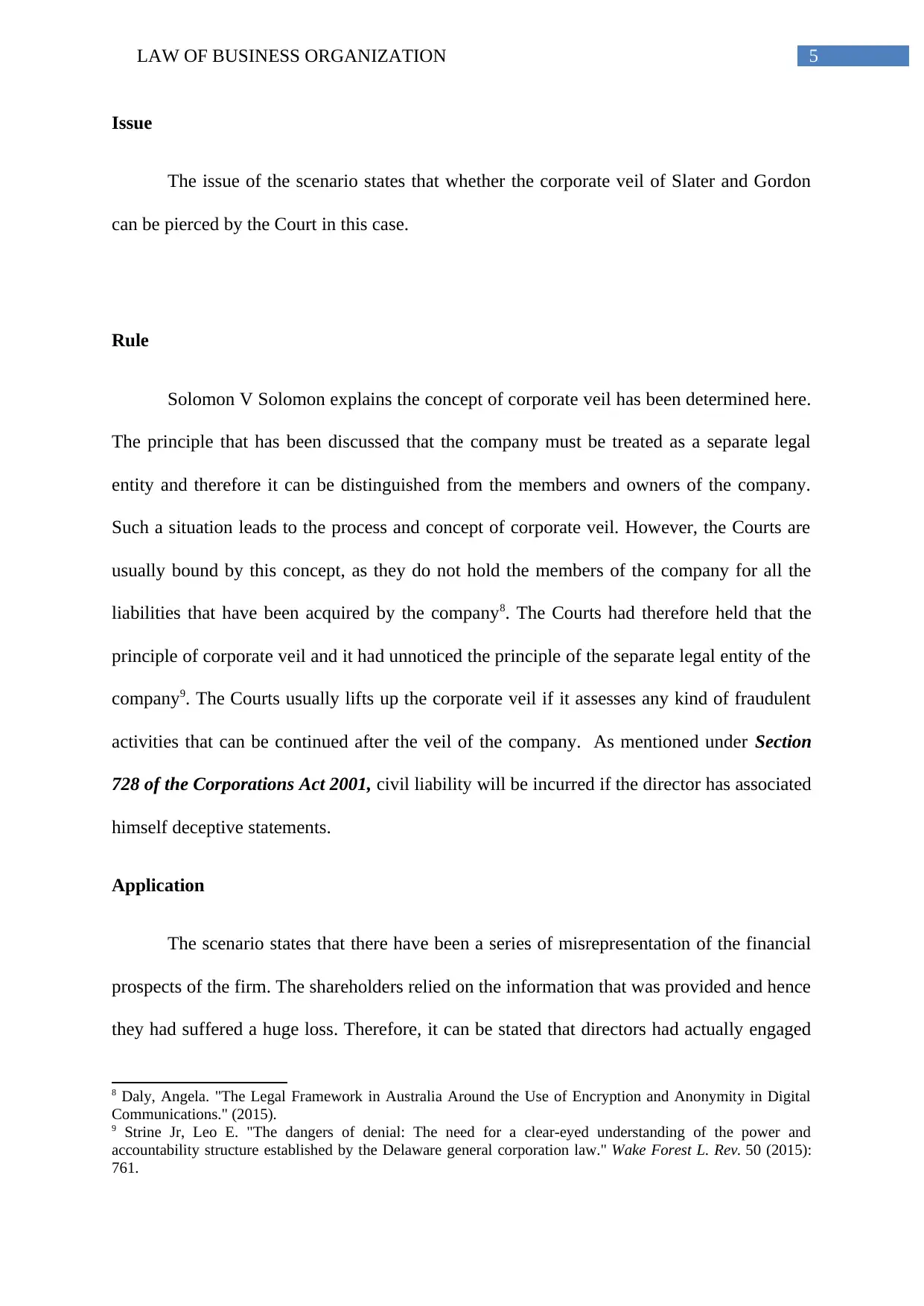
5LAW OF BUSINESS ORGANIZATION
Issue
The issue of the scenario states that whether the corporate veil of Slater and Gordon
can be pierced by the Court in this case.
Rule
Solomon V Solomon explains the concept of corporate veil has been determined here.
The principle that has been discussed that the company must be treated as a separate legal
entity and therefore it can be distinguished from the members and owners of the company.
Such a situation leads to the process and concept of corporate veil. However, the Courts are
usually bound by this concept, as they do not hold the members of the company for all the
liabilities that have been acquired by the company8. The Courts had therefore held that the
principle of corporate veil and it had unnoticed the principle of the separate legal entity of the
company9. The Courts usually lifts up the corporate veil if it assesses any kind of fraudulent
activities that can be continued after the veil of the company. As mentioned under Section
728 of the Corporations Act 2001, civil liability will be incurred if the director has associated
himself deceptive statements.
Application
The scenario states that there have been a series of misrepresentation of the financial
prospects of the firm. The shareholders relied on the information that was provided and hence
they had suffered a huge loss. Therefore, it can be stated that directors had actually engaged
8 Daly, Angela. "The Legal Framework in Australia Around the Use of Encryption and Anonymity in Digital
Communications." (2015).
9 Strine Jr, Leo E. "The dangers of denial: The need for a clear-eyed understanding of the power and
accountability structure established by the Delaware general corporation law." Wake Forest L. Rev. 50 (2015):
761.
Issue
The issue of the scenario states that whether the corporate veil of Slater and Gordon
can be pierced by the Court in this case.
Rule
Solomon V Solomon explains the concept of corporate veil has been determined here.
The principle that has been discussed that the company must be treated as a separate legal
entity and therefore it can be distinguished from the members and owners of the company.
Such a situation leads to the process and concept of corporate veil. However, the Courts are
usually bound by this concept, as they do not hold the members of the company for all the
liabilities that have been acquired by the company8. The Courts had therefore held that the
principle of corporate veil and it had unnoticed the principle of the separate legal entity of the
company9. The Courts usually lifts up the corporate veil if it assesses any kind of fraudulent
activities that can be continued after the veil of the company. As mentioned under Section
728 of the Corporations Act 2001, civil liability will be incurred if the director has associated
himself deceptive statements.
Application
The scenario states that there have been a series of misrepresentation of the financial
prospects of the firm. The shareholders relied on the information that was provided and hence
they had suffered a huge loss. Therefore, it can be stated that directors had actually engaged
8 Daly, Angela. "The Legal Framework in Australia Around the Use of Encryption and Anonymity in Digital
Communications." (2015).
9 Strine Jr, Leo E. "The dangers of denial: The need for a clear-eyed understanding of the power and
accountability structure established by the Delaware general corporation law." Wake Forest L. Rev. 50 (2015):
761.
⊘ This is a preview!⊘
Do you want full access?
Subscribe today to unlock all pages.

Trusted by 1+ million students worldwide
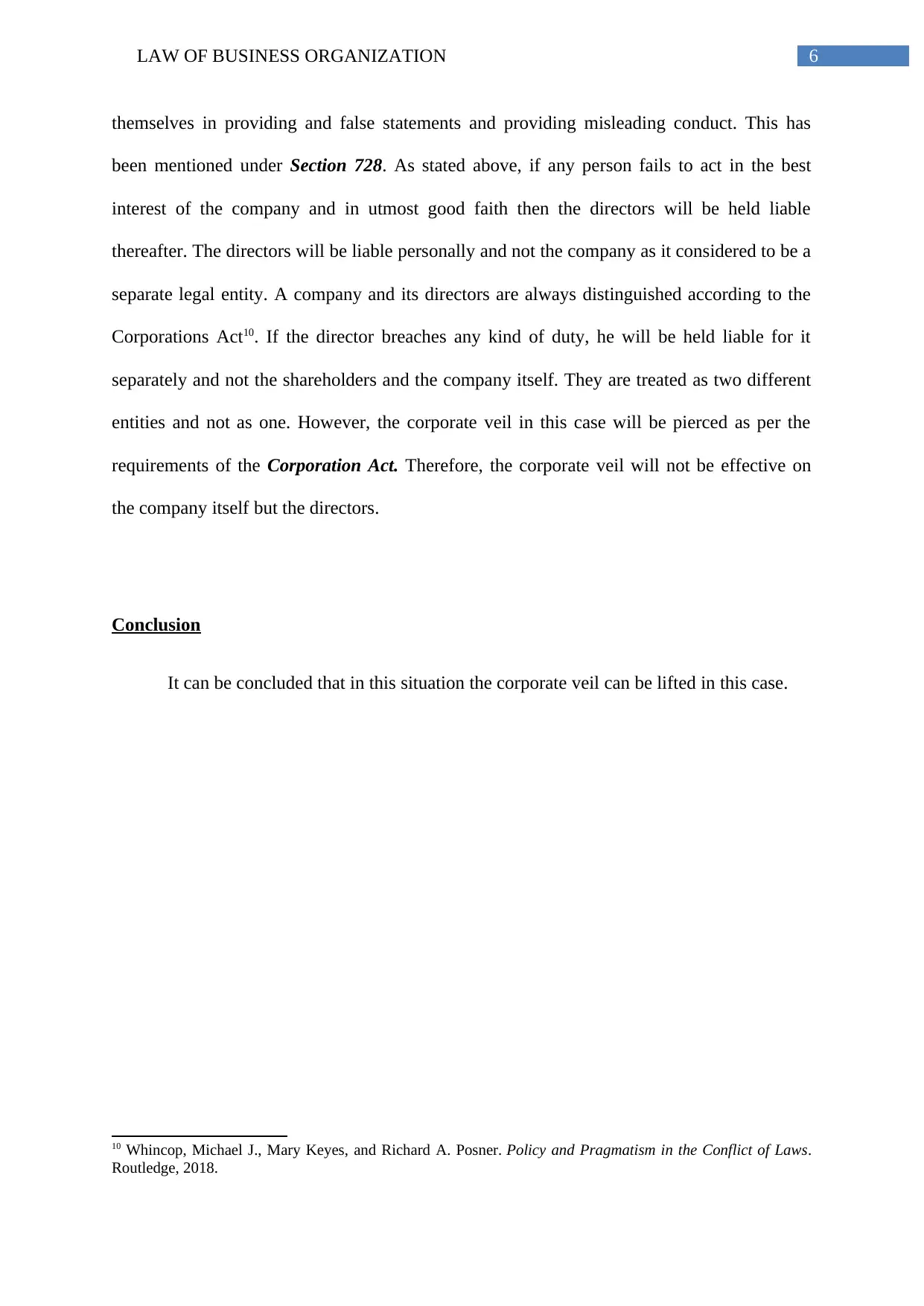
6LAW OF BUSINESS ORGANIZATION
themselves in providing and false statements and providing misleading conduct. This has
been mentioned under Section 728. As stated above, if any person fails to act in the best
interest of the company and in utmost good faith then the directors will be held liable
thereafter. The directors will be liable personally and not the company as it considered to be a
separate legal entity. A company and its directors are always distinguished according to the
Corporations Act10. If the director breaches any kind of duty, he will be held liable for it
separately and not the shareholders and the company itself. They are treated as two different
entities and not as one. However, the corporate veil in this case will be pierced as per the
requirements of the Corporation Act. Therefore, the corporate veil will not be effective on
the company itself but the directors.
Conclusion
It can be concluded that in this situation the corporate veil can be lifted in this case.
10 Whincop, Michael J., Mary Keyes, and Richard A. Posner. Policy and Pragmatism in the Conflict of Laws.
Routledge, 2018.
themselves in providing and false statements and providing misleading conduct. This has
been mentioned under Section 728. As stated above, if any person fails to act in the best
interest of the company and in utmost good faith then the directors will be held liable
thereafter. The directors will be liable personally and not the company as it considered to be a
separate legal entity. A company and its directors are always distinguished according to the
Corporations Act10. If the director breaches any kind of duty, he will be held liable for it
separately and not the shareholders and the company itself. They are treated as two different
entities and not as one. However, the corporate veil in this case will be pierced as per the
requirements of the Corporation Act. Therefore, the corporate veil will not be effective on
the company itself but the directors.
Conclusion
It can be concluded that in this situation the corporate veil can be lifted in this case.
10 Whincop, Michael J., Mary Keyes, and Richard A. Posner. Policy and Pragmatism in the Conflict of Laws.
Routledge, 2018.
Paraphrase This Document
Need a fresh take? Get an instant paraphrase of this document with our AI Paraphraser
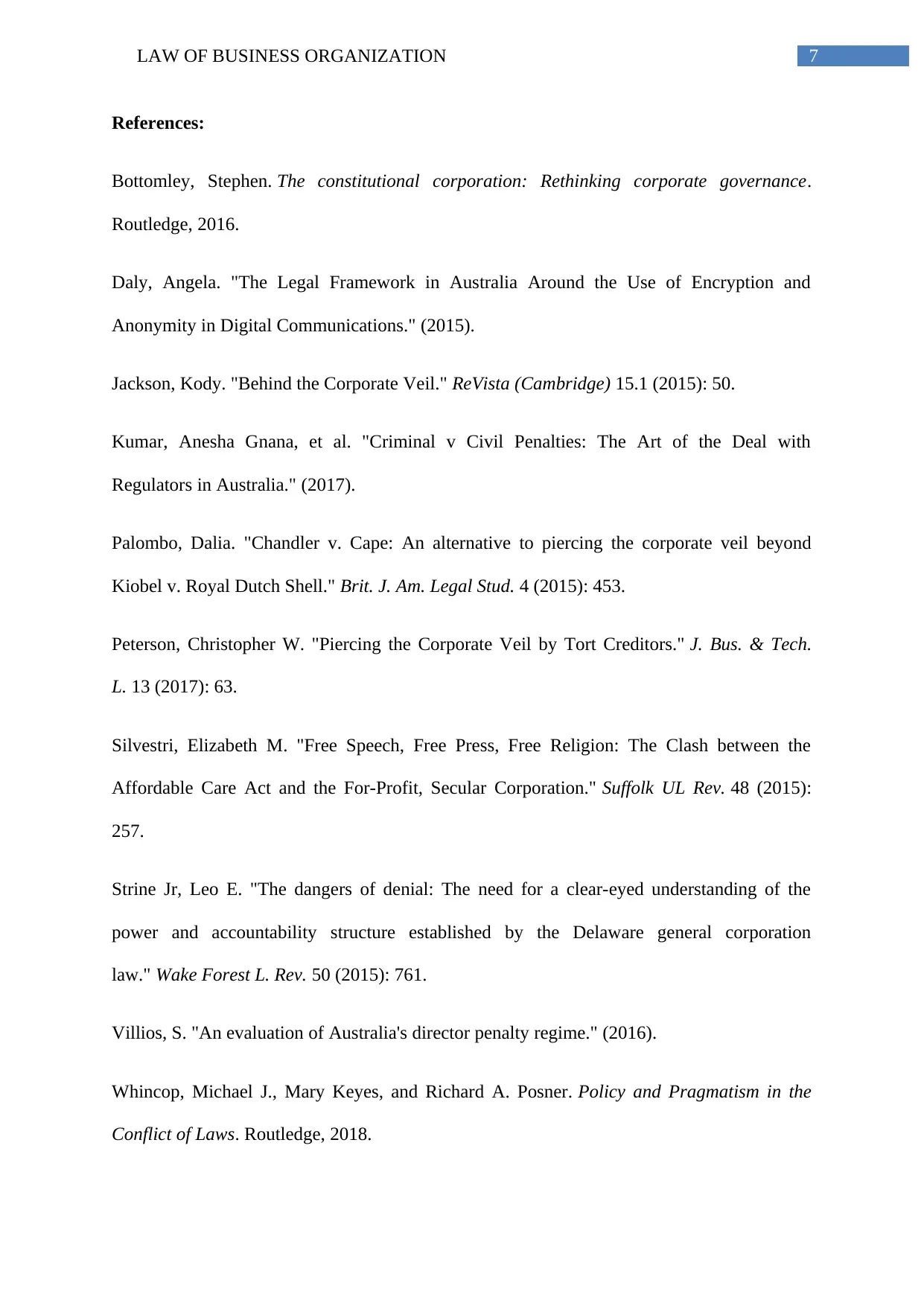
7LAW OF BUSINESS ORGANIZATION
References:
Bottomley, Stephen. The constitutional corporation: Rethinking corporate governance.
Routledge, 2016.
Daly, Angela. "The Legal Framework in Australia Around the Use of Encryption and
Anonymity in Digital Communications." (2015).
Jackson, Kody. "Behind the Corporate Veil." ReVista (Cambridge) 15.1 (2015): 50.
Kumar, Anesha Gnana, et al. "Criminal v Civil Penalties: The Art of the Deal with
Regulators in Australia." (2017).
Palombo, Dalia. "Chandler v. Cape: An alternative to piercing the corporate veil beyond
Kiobel v. Royal Dutch Shell." Brit. J. Am. Legal Stud. 4 (2015): 453.
Peterson, Christopher W. "Piercing the Corporate Veil by Tort Creditors." J. Bus. & Tech.
L. 13 (2017): 63.
Silvestri, Elizabeth M. "Free Speech, Free Press, Free Religion: The Clash between the
Affordable Care Act and the For-Profit, Secular Corporation." Suffolk UL Rev. 48 (2015):
257.
Strine Jr, Leo E. "The dangers of denial: The need for a clear-eyed understanding of the
power and accountability structure established by the Delaware general corporation
law." Wake Forest L. Rev. 50 (2015): 761.
Villios, S. "An evaluation of Australia's director penalty regime." (2016).
Whincop, Michael J., Mary Keyes, and Richard A. Posner. Policy and Pragmatism in the
Conflict of Laws. Routledge, 2018.
References:
Bottomley, Stephen. The constitutional corporation: Rethinking corporate governance.
Routledge, 2016.
Daly, Angela. "The Legal Framework in Australia Around the Use of Encryption and
Anonymity in Digital Communications." (2015).
Jackson, Kody. "Behind the Corporate Veil." ReVista (Cambridge) 15.1 (2015): 50.
Kumar, Anesha Gnana, et al. "Criminal v Civil Penalties: The Art of the Deal with
Regulators in Australia." (2017).
Palombo, Dalia. "Chandler v. Cape: An alternative to piercing the corporate veil beyond
Kiobel v. Royal Dutch Shell." Brit. J. Am. Legal Stud. 4 (2015): 453.
Peterson, Christopher W. "Piercing the Corporate Veil by Tort Creditors." J. Bus. & Tech.
L. 13 (2017): 63.
Silvestri, Elizabeth M. "Free Speech, Free Press, Free Religion: The Clash between the
Affordable Care Act and the For-Profit, Secular Corporation." Suffolk UL Rev. 48 (2015):
257.
Strine Jr, Leo E. "The dangers of denial: The need for a clear-eyed understanding of the
power and accountability structure established by the Delaware general corporation
law." Wake Forest L. Rev. 50 (2015): 761.
Villios, S. "An evaluation of Australia's director penalty regime." (2016).
Whincop, Michael J., Mary Keyes, and Richard A. Posner. Policy and Pragmatism in the
Conflict of Laws. Routledge, 2018.
1 out of 8
Related Documents
Your All-in-One AI-Powered Toolkit for Academic Success.
+13062052269
info@desklib.com
Available 24*7 on WhatsApp / Email
![[object Object]](/_next/static/media/star-bottom.7253800d.svg)
Unlock your academic potential
Copyright © 2020–2026 A2Z Services. All Rights Reserved. Developed and managed by ZUCOL.





